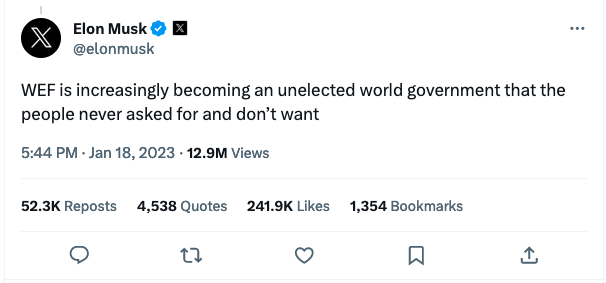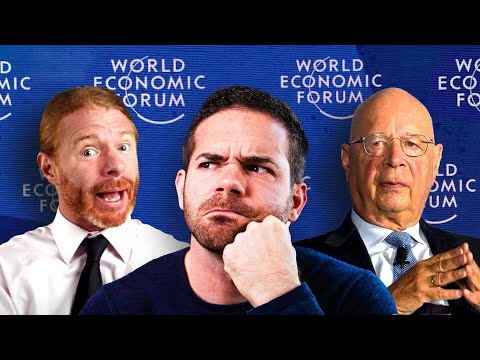Elon Musk’s recent contention with the World Economic Forum (WEF) sheds light on the deep-seated fear that people often have of organizations accumulating too much power. This fear is rooted in the recognition that organizations, like individuals, possess a dual nature capable of both virtuous and malevolent actions. Historical examples, psychological factors, and economic implications contribute to this unease.
It’s important to note that criticism of the WEF must also acknowledge its significant contributions. The WEF has been instrumental in shaping global discourse and facilitating constructive dialogues. Many of the innovative ideas that have emerged from the WEF’s platforms have led to positive changes worldwide. The annual meeting in Davos, which brings together a diverse array of world and thought leaders, has become a beacon of peaceful collaboration and exchange.
Throughout history, large organizations have showcased the potential for a shift from virtuous intentions to darker motives as power accumulates. The Roman Empire, once a republic with noble ideals, transformed into a tyrannical regime. Similarly, corporations that initially pursue noble causes can prioritize profit over ethics, leading to social inequality. This transition from virtue to self-preservation underscores the fragility of maintaining an honorable course when power becomes unchecked.
Psychologically, the fear of unchecked power in organizations is grounded in concerns about accountability and ethical behavior. Research has shown that individuals in positions of authority can exhibit a propensity for unethical actions. Instances like the Stanford Prison Experiment and the Milgram Experiment highlight how power can lead to harmful behavior. This psychological phenomenon extends to organizations, where leaders might prioritize self-interest over the common good.
Economically, historical realities have fueled the fear of powerful organizations. Large entities have contributed to conflicts and global inequalities. The fear is not unfounded; history and economics have demonstrated the potential for organizations to wield their power in ways that exacerbate conflicts and inequalities. This apprehension often results in conspiracy theories that caution against the potential dangers of unchecked power.
To counter this fear, a potential solution lies in decentralization. By fostering the coexistence of various organizations with differing viewpoints, a system of checks and balances is established. When one organization amasses excessive power, the presence of alternative entities prevents unchecked dominance. An organization’s willingness to coexist and embrace competition of ideas can be a measure of its benevolence. In contrast, an organization that suppresses opposing viewpoints and seeks to absorb or silence dissenting voices may indicate a shift toward malevolence.
In conclusion, the fear of unchecked power within organizations emerges from historical lessons and psychological insights. Elon Musk’s contention with the World Economic Forum highlights the broader societal apprehension of unchecked power. The potential for organizations to transition from virtuous motives to self-preservation underscores the importance of vigilance. A decentralized environment, where various organizations coexist, provides a potential solution to mitigating this risk. The ultimate challenge lies in maintaining ethical values and preventing the erosion of these values when faced with the allure of unchecked power. It is important to remember that even in criticism, the WEF has played a pivotal role in fostering global dialogue and shaping positive change.

